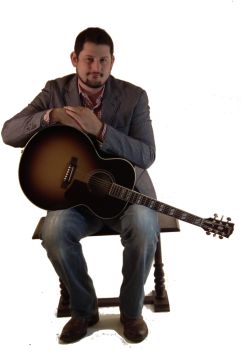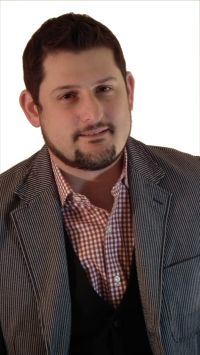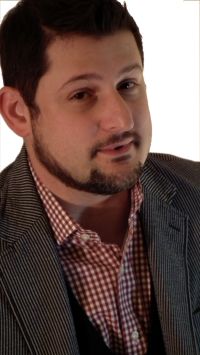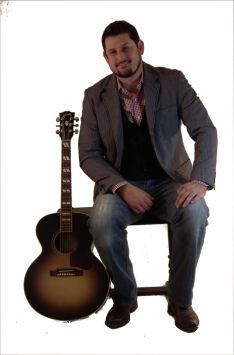social bookmarking tools:
 |
|
| Available RSS Feeds |
|---|
 - Top Picks - Top Picks |
 - Today's Music - Today's Music |
 - Editor's Blog - Editor's Blog
|
 - Articles - Articles
|
Add Louisville Music News' RSS Feed to Your Yahoo!
|
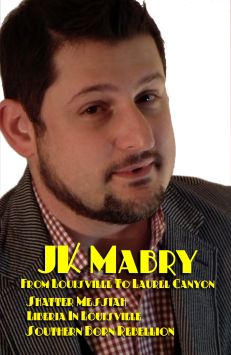
JK Mabry: From Louisville to Laurel Canyon
JK Mabry woke up in a lawn chair overlooking Los Angeles.
The Louisville singer-songwriter played a show at the Standard Hotel as part of the hotel's "Desert Nights" showcase, had hung out for a while after across the street at the Chateau Marmont, met a couple of girls and got invited to a party at a beautiful LA home in the Laurel Canyon neighborhood.
You can pretty much fill in the blanks from there. Suffice to say, the best songs often come from the best back stories. Such is the case with Mabry's tune "Laurel Canyon."
"Everyone was gone," he said of when he awoke in the chair. "I had no idea where I was. I went back to my hotel room and literally wrote half the song in ten minutes."
Mabry said the experience was probably aided by the fact that he'd just gotten out of a "fairly long" relationship. "There's nothing more lonely than traveling across country to play alone and then wandering Sunset Blvd and meeting strangers," he said.
Good songs often come from loneliness. too.
"The good ones come so easy," Mabry, who is working on an EP tentatively titled after the song, said. "And I like to think that's one of my better songs. It's kind of like Hank Williams meets Mazzy Star. It's kind of dark, but it's got that Americana kind of groove and thumb-picking."
Mabry is one of those unassuming guys you might see strolling around the Highlands, perhaps sipping a Pabst Blue Ribbon at Bearno's or venturing down to Uncle Slayton's to play a set. But he has his sights set on other, well, sites. In addition to playing at The Standard, he also has traveled south to play at Nashville's famous Bluebird Café in the Sunday Writers Showcase.
It's out of town where he sees himself focusing; playing for new faces is always refreshing for a musician. But the crowds in so many Louisville bars and venues seem to be after background music – they may sit and talk to their friends while the band plays, then they'll jump up and dance like wild, naked savages during a break when the house PA system pipes in "Footloose."
That's exactly why, when the opportunity arises, Mabry heads for The Bluebird or some other venue or showcase that is focused more on the music than on the party.
"Those people [at The Bluebird] come to hear music, and they come to hear music they haven't heard before," he said.
And it's not that he isn't in it to show the crowd a good time – "I don't expect people to come to my shows and make courtroom drawings of me – that's no fun," he said – but his unique blend of Americana, rock and country isn't exactly dance music either.
"What I choose to play is a little more listener-intensive, I guess," he said. "I tell stories about people I know, so it's not going to make lot of sense if you only listen to one line of it."
Jess Langer sings backup vocals for Mabry, and calls him a "phenomenal story teller both in normal conversation and in songwriting. Somehow, even after singing with him for so long I still find myself getting sucked into each song as if I were living it. Most of all, his music is honest."
To that end, Mabry really doesn't hear genres –- he just hears music. That could be part of why his own music is so difficult to classify. It's also why he doesn't recognize any limitations about where he can and should be playing.
"I go see everybody in town," he said. "I don't put people in one folder and others in another. I'll play a hipster spot, then I'll play a commercial spot. My thing has been to get my music out to as many people as possible. If that's not a priority as artists, maybe we should question what we're doing."
The 'aw shucks' in him, however, keeps him rolling with the flow. Where so many local artists can scarcely hold back bitter feelings about playing to empty rooms, Mabry just keeps on playing the tunes he wants to play to whomever will listen, and the bandmates who back him up are happy to be along for the ride.
"It's hard to be a rock star in your own home town," said Margarette Evans, who plays some keys for and sings with Mabry. "People want to see something different. It's a common problem for most musicians, I think. If a band from Nashville comes to play in Louisville, it's a big deal. However, if they're playing a gig at home back in Nashville, it's often an empty room there as well."
To Mabry, the very concept of live music can even seem a bit awkward.
"I'm going to give complete stranger money to stand and watch them play?" he said. "Would you pay to go watch somebody play chess? I guess some would. But the concept of it is kind of strange sometimes."
To Mabry, music is better taken as a shared experience. This is why you won't ever see him perform a Dave Matthews- or Springsteen-esque, three-hour show with impossibly long instrumentals and four encores.
"I'm not a fan of long concerts," he said. "I would rather hear 45 minutes and then carry on with the rest of my evening.
"I think when artists start doing these really long shows, it's a slippery slope. The fans are the ones doing us a favor. It's symbiotic – or should be."
MOTIVATIONAL STAGE FRIGHT?
A lot of musicians, when asked why they wanted to perform music, will talk about inspiration and how music is just part of who they are. Fair enough. Mabry is a bit frank, however, when he admits that in a way it was about conquering something.
"For me, [the way] it started – it was to scare myself," he said. " I don't want to say I have stage fright. It was a challenge. 'Can I go do this?' If you think about it, it's pretty f**king audacious, [performing] music."
Mabry was raised in the Highlands, but his family moved to Nashville when he was in grade school, where obviously he was surrounded by the music industry.
He said his parents always pushed music on him, and "God bless them, anything I wanted to do musically, they were supportive. I probably couldn't have done any of this without them."
The family moved back to Louisville after Mabry graduated high school, which he quickly followed by going to college at the University of Kentucky. After graduation, he moved back to Nashville for about five years and stayed there until 2006.
He did not, however, go there as a budding musician.
"All my buddies …. They started creating their own publishing companies, and I was always in the thick of it, but I didn't play."
He had played in Jazz spoken-word band in college, but that was pretty much the extent of it up to that point.
"I said, 'When I get home to Louisville, I'm going to take a real stab at songwriting.' I sat on the couch one day and wrote 'Whiskey & Perfume.' That was the first song I ever wrote."
During this time, he was bartending. He started playing "Whiskey & Perfume" for people, and got a good response. He ended up landing in Bearno's for an open-mic night, performed, and from that point "it's just snowballed."
That first performance was in early 2010, he said. He soon had written enough material for a complete set, including "Whiskey & Perfume." And he also decided to enter the song in the John Francis and John Carter Cash Songwriting Competition. To his surprise, he was a finalist in the competition and was awarded a unique prize for his efforts.
"I have the opportunity to go down and record at Johnny Cash's cabin," he said. "I'm hoping to do that in the spring. John Carter Cash will produce, along with Ken Coomer of Wilco."
Interestingly, less than a year and a half after he began writing songs and performing publicly, he was hitting the road and opening for acts such as Uncle Kracker. Yes, a so-called singer-songwriter opening for Uncle Kracker – that's the benefit to not picking a genre for yourself.
"It's been great," Mabry said. "I guess I haven't been pigeon-holing myself enough."
He kids. He actually likes the fact that people who see him play can never be sure what to expect.
"I always tell Jess Langer our goal when we get offstage is for the audience to be sad and confused," he said. Not a bad place to set one's sights.
THE BIG ONE?
The forthcoming Laurel Canyon album is going to be equally as unpredictable. While many of the songs will be stripped down, at least one – the title track – will be the opposite of stripped down.
Matt Davidson, who also plays guitar in Mabry's band, is producing and mixing the album, and Dane Rodriguez is playing lead guitar, and Evans and Langer will fill their usual slots.
One of the new favorites that will be on the album is "Come Around," which may actually end up as two different versions.
"It's very simple, it's four chords," Mabry said, "but there are a lot of coded messages in it. People come up [at shows] and say, 'I can see everything going on in my head, but I don't know what it means.' It's just about apartment living and late-night guests … and really, it's about emptiness but at the same time having everything around you. I think that song really sums up the sad and confused thing. "
Evans lists this as among her favorite tracks as well. "It's the perfect post-breakup song. There's one killer line: 'A little sweat between the thighs.' In any other song that might sound vulgar, but it's completely effective in this song."
She said the album as a whole is going to be strong, especially from a lyrical perspective.
"His songs are so well-written, they don't need a lot of production," she said. "JK is a natural story teller, and his songs are full of that. There is vagueness in his writing that allows the listener to be the main character in his songs. That's the trick, you know, to make the song applicable to an audience while keeping it intensely personal. JK is good at walking that line."
"We're going to get really Flying Burrito Brothers on one called 'Porcelain Doll,'" Mabry said. "We play it uber-country.
"As usual, the songs are going to be pretty melancholy. Every line is about someone in my life. A lot of times I compare people to fruit. Every line is about a character. It's always nice when I'm playing those songs, because a lot of times those people in the songs are close to me, so when I play them they are still close to me, even if I'm on the road."
And it bears noting that the songs are not just interesting lyrically, but also accessible musically.
"He writes such great hooks," Langer said, "which is refreshing to me, because I think a lot of songwriters have lost that. His style relates so well to country music back when the song was all about that one line – the hook."
As for the title track, well, Mabry is going all out. As in, even Phil Spector himself would be proud. As in, the first mix has 39 tracks.
"It has a chorus of five different voices, mandolin, sound effects," he said. "It's pretty out there for me. It's my stab at making that 'wall of sound,' but still keeping an Americana influence."
"I've gotten to hear a few of the mixes and it's amazing," Langer said. "He got weird with it. It's experimental, beautiful and weird all at the same time."
Look for the CD sometime in the spring – probably. More than likely, you'll be downloading it from iTunes, however. Mabry is one musician who has embraced the changing of the guard.
"I will probably press physical copies for a radio push," he said. "I don't even sell CDs at shows anymore. I just announce, 'Go to iTunes. Or even, if you want to, stream it. Every month I get more streams. Do I make less money? Yeah. But more people are listening.
"I can't tell you how many times people [at a show] say, 'I really like your music,' and then they get out their phone, call up iTunes and they it buy."
And if they are buying and/or listening, well, that's all Mabry can ask. He just wants to continue putting honest (and sometimes weird) music out there, all to make his audience feel sad and confused.
"You find reasons you do it, and reasons you want to keep doing it," he said. "I feel comfortable with the people I play with. I have always surrounded myself with people who can play better than me."
This is a point he emphasizes – his business card says "songwriter," not "guitarist." "Dane does that much better than me," he said of his playing skills.
However, he said, "I think I'm a good songwriter. I'm the guy that will go out and say let's take a hipster band member and a blues band member, and I've got this song, and everybody put their head into it and see what we come up with. And dammit, I think we're coming up with good stuff."

